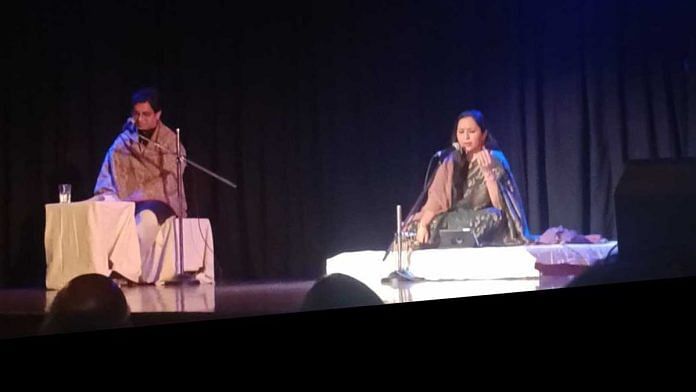New Delhi: Daagh Dehlvi found love in Delhi’s royal courts, narrow alleys, bustling markets and distinctive sounds and smells. And he wrote about it in Urdu, a language that clawed its way to popularity at a time when the Mughal elite embraced Persian. His Urdu poems and couplets were once all the rage, but with the passage of time and his move to Hyderabad where he died in 1905, his words faded from Delhi’s popular memory.
A mehfil aptly called ‘Love, Loss, and Longing – The Delhi Poets,’ at the India International Centre on 10 January reminded poetry and music lovers that there were poets beyond Khusrau, Ghalib and Mir. Hindustani classical singer Vidya Shah sang a curated list of ghazals, nazms, taranas and thumri, while lawyer and history buff Chandrashekhar Tampi introduced the poets from the Delhi school of Urdu poetry.
Tampi, who conducts heritage walks in Delhi, traced the evolution of Urdu in the capital city. Like Hyderabad, Delhi attracted poets, authors and artists from all over India. Its Urdu, enriched by distinctive idioms and figures of speech, bore a flavour distinct from its Awadh or Deccan counterparts, said Tampi.
“The city’s women, particularly the courtesans, embraced Urdu fervently, contributing their vocabulary and mannerisms to the language’s tapestry. The variety of their expressions embodied the versatile nature of Urdu,” Shah later told ThePrint.
But after the 1857 Mutiny, the Muslims of the city were driven out and with them so was the poetry. It paralleled the diminishing supremacy of Qila-e-Moalla or the Red Fort where Daagh and the other poets once held their mushairas.
Mirza Mohammad Rafi Sauda in the early 18th century and Dehlvi and Bahadur Shah Zafar in the late 19th century hammered and hewed love, longing and loss into verse and couplets. And on a cold winter evening, Shah and Tami blended music, poetry and narrative history to recreate Delhi’s poetic past.
Also Read: Stop fighting over Hindi vs Urdu. Hindustani is the answer, says Javed Akhtar
Reliving histories and cultures
Both Shah and Tampi want to make Urdu, its literature and poetry, accessible to everyone. After all, they are first-generation Hindi and Urdu speakers from South India. Shah is a Tamilian and Tampi is a Malayali. Their love for music and poetry drew them to Urdu, a language that increasingly seems to be ‘vanishing’ from the city’s soundscape.
“It has a lot to do with how a dispensation views any language. We don’t see English as a Christian language or Sanskrit as a Hindu language, yet somehow recently over the years, Urdu has gained the reputation of being Muslim,” said Tampi.
During the mehfil, he took the audience back to around the 1700s when Wali Mohammad Wali, often hailed as the father of Urdu poetry, visited Delhi from his hometown in Maharashtra. In his narration, Tampi highlighted how Urdu, disdainfully labelled rekhta or “assorted dialect”, clashed with the refined Persian monopolisation of poetry. Despite the initial resistance, Wali’s powerful expression set the tone for the evolution of the Urdu ghazal.
As empires rose and fell, Urdu travelled from the Decaan to Delhi and back again. More than a hundred years later, in 1888, Daagh brought Delhi’s Urdu back to the Deccan when he moved to Hyderabad where he was court poet and mentor to the sixth Nizam.
Shah sees cultures as “a binding force” that reshape themselves and create ‘‘a tapestry of many possibilities” and this was reflected in the audience’s response. The gamut of generations from X to Z enjoyed the mehfil.
“When I was on stage and singing a Dil-e-nadaan [Ghalib’s ghazal] or a Piya baaj Pyala, Piya Jaye Naa [Quli Qutub Shah], the sheer ecstasy of the audience’s experience gave me so much joy. The response is like a myth-buster that proves music or culture transcends genre(s) or ages,” said Shah.
She ended the night with a lament from the Urdu poet and last Mughal emperor, Bahadur Shah Zafar who was exiled from Delhi to Rangoon, Burma (now Yangon, Myanmar).
“Kitna hai bad-nasib ‘Zafar’ dafn ke liye/ Do gaz zameen bhi na mili ku-e-yaar mein” —How unfortunate is ‘Zafar’ who is unable to find, for his burial, even two yards of ground in the streets of his beloved.
(Edited by Theres Sudeep)



